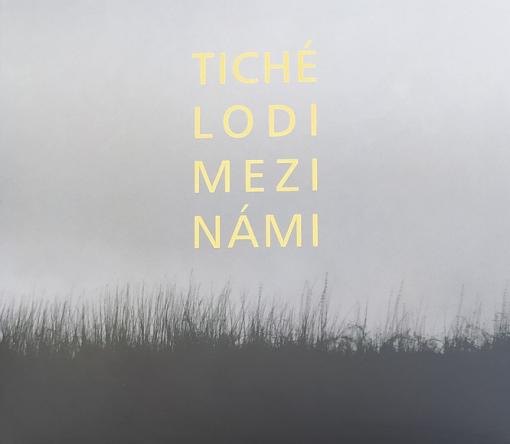Tiché lodi ('Silent Ships') is not a band, but a project of the guitarist and singer René Müller, who lives in Brno. While he recorded his previous album Časy vody ('Times of Water' – 2015) working together with Roman Cipísek Cerman, his former colleague from the band Hynkovy zámky ('Hynek's Locks'), Müller is now appearing all by himself on the new album – as writer of the music and lyrics, guitarist and singer, or – in his case more precisely – narrator.
It is his vocal expression in particular that can be described as a melodic recitation rather than singing, which is characteristic of Tiché lodi. At the first listening, the songs will bring to mind other artists who work with this position at least in a certain part of their works: Vladimír Václavek, Jan Šoltis from the group Betula Pendula, and above all Oldřich Janota. In some moments, including the introductory song Chytali jsme sníh ('We Caught the Snow'), René Müller is getting close to him with both the diction and poetics of the lyrics. Müller himself would have to answer the question of whether it is more admitted plagiarism, a subconscious inspiration, or a virtue out of necessity (he does not want to, or even cannot, sing "normally"). However, let's try to look at his new album as a work recorded according to a certain canon, and thus completely legitimate within the genre.
The important thing is that the album Silent Ships is not a multiple infusion of Janota, Václavek or anyone else, but a set of songs with a strong message and lyrics that are worth reading even without the musical component. René Müller presents small stories over about fifty minutes, which could form, for example, a good book of short stories. At the same time, the plot layer of the texts does not lag behind the lyrical elements, suggestive descriptions of the landscape with a great sense of detail. An example of this is the introductory song Chytali jsme sníh: "Ráno už sníh zavál / i Bolatický mlýn / všude bylo bílo / zůstalo pár divných skvrn." ("In the morning, the snow had already covered / even the Bolatice mill / it was white everywhere / there were just a few peculiar stains left.") Müller uses rhyme and assonance in his lyrics, but he is at his best in free verse; one of the strongest moments is the existential miniature Co bude ('What Will Happen') with the conclusion: "Co bude, až tady nebudu / Kdo popel vynese / světnici vyvětrá?" ("What will happen when I'm no longer here / Who will take out the ashes / And air the room?"). On the other hand, an attempt at phonetic alliteration at the end of the verse sometimes sounds too mechanical (“ve vedlejší místnosti / […] / že se dalo krájeti“ ("in the next room / […] / that it could be chopped"), but fortunately the suggestive mood of the song usually does not suffer from that.

The album contains both some miniatures, in which two or three minutes are enough to sketch a story and invoke an atmosphere (Bylo slyšet ['It Could Be Heard']), as well as several more extensive compositions, such as the nine-minute piece Když prší z nebe ('When It Rains from the Sky'), in which various forms and moods alternate. The almost six-minute song Malý kluk ('The Little Boy') also has a more articulated structure, and once again both musically and concerning the "action".
We could get things over with the musical component of the album by stating that René Müller accompanies himself on guitar; however, that would not do him justice. The album Mezi námi ('Between the Two of Us') stands far from the traditional concept of a singer-songwriter with an acoustic guitar. René Müller paints such a background to his recitations with surfaces that it hardly matters whether he renders them on an electric guitar enriched with sound effects, or on a keyboard or an electronic instrument. After all, the tones that resound in the song Hvězda ('The Star') are relatively distant from the classical idea of the guitar. In some other places, the tones of the strings are better distinguishable, but their repetitive character and sound blurriness correspond perfectly to the selected vocal expression.
There is also one more detail that is worth attention. The album Mezi námi ('Between the Two of Us') was released at the same time as the new album Potom ('After') by the singer-songwriter and musician Jan Fic. In spite of the fact that René Müller has a completely different expression, the way of working with the guitar and the style of writing lyrics, we may find interesting "social" parallels on both of the two records. For Fic, it means "somrák, kdysi taky něčí táta ('a hobo, once also someone's dad')" who "dopil víno, co se nevešlo do flašky od coly" ('finished drinking his wine, which did not fit in a coke bottle') and beside him there is the narrator who maybe "ráno zase přijde k snídani" ('will come home for breakfast again in the morning'). For Müller, this means "schoulená žena" ('a huddled woman') who "hledala své štěstí na kraji světla / jak raněné zvíře houpe se v bocích / v klíně má chlapa co se jí hnusí / Co taky dělat, když pryč je už měsíc / doma má děti co nakrmit musí" ('had looked for her happiness at the edge of the light / like a wounded animal she's swinging her hips / has a guy in her lap that makes her sick / What shall she do after all when he's been gone for a month already / at home she has kids she has to feed'). Who knows if the heroes of these two strong socially oriented lyrics are not wandering around Brno together.
Tiché lodi – Mezi námi; Indies Happy Trails 2020, 11 tracks, total playing time 52:21
































No comment added yet..